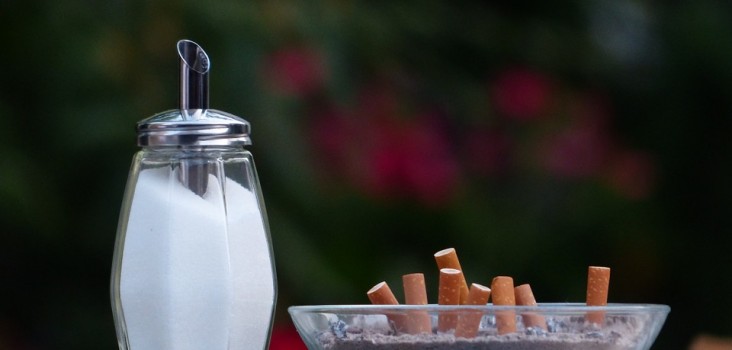15th February 2016
Why Do We Treat Smoking And Sugar So Differently?

I’ve been on what can sometimes feel like a UK tour of hospitals in the last year. Consultations here, appointments there. We’ve wanted as many opinions as possible and that’s taken us all over the place.
And every single hospital I’ve been too has one thing in common – the way they treat smoking.
All sites I’ve seen have declared themselves ‘smoke-free’ – meaning 90-year-olds in hospital gowns are no longer able to have a crafty fag outside the hospital entrance.
I’ve always had a bit of a bee in my bonnet about smoking. When I was a kid, me and my sister would make our own ‘No Smoking’ signs and put them up around the house in a bid to persuade my parents. It must have worked because they haven’t smoked in years.
I’m not such a preacher about it these days – each to their own – but I’ve just never understood why people do it. And when I go to hospitals and see clearly ill people having a crafty one, it does get me riled up sometimes. It’s why I love the fact hospitals have taken the step of making their sites cigarette-free. Of course, what it means in practice is that there’s a chain of smokers lined up just off-site – but it’s the thought that counts. Hospitals should be praised for taking the time to try and make a difference and in fairness, taking action seems to be working, because smoking is not now the leading cause of illness in the UK.
However, it’s not necessarily news to celebrate because its title – according to a recent Public Health England study – has gone to diet, which causes 10.8 per cent of illnesses.
So with that in mind, why haven’t hospitals become sugar-free sites?

I couldn’t help but grab my phone and take a photo when I saw this sweets trolley get wheeled past my bed.
Walk into hospital canteens and you will be presented with chocolates, donuts, crisps, biscuits, fizzy drinks and hot chocolates. We’ve often found it harder to get hold of a bottle of water than a can of Coke or Fanta and once found a tea bar in Birmingham Hospital that only sold biscuits and sweets – not a banana in site.
During my recent treatment I even spotted a trolley filled to the brim with sweets and crisps being wheeled past my bed. A strange sight when you’re being treated on a cancer ward!
It’s one of my biggest frustrations with the NHS, and we often chuckle to ourselves in disbelief every time we walk past a vending machine filled to the brim with sweets. I even wrote to Jamie Oliver recently suggesting he look into the issue but I didn’t hear back. I guess he’s got enough on his plate.
I still tuck into chocolate from time-to-time, but it’s always of the ultra-dark variety, normally 85 or 90 per cent. But I still find myself getting sucked in by clever sugar industry marketing – the bright colours all the brands have, the names, the clever adverts, the taglines. Dairy Milk’s famous tagline ‘A glass and a half’ – referring to the milk it contained – is a particularly good one, considering it also contains six teaspoons of sugar.
It must be said that on some wards it’s better for particularly ill patients to have sugar-filled food than nothing at all, but I guess the main reason chocolate is still on the menu is because it sells. It took a four-inch tumour for me to realise the error of my ways and even now I struggle to resist grabbing the dessert menu when eating out. We’re all just so addicted to the stuff.
I don’t know what the experts would say, but my hunch would be that the hospitals are simply a reflection of our culture. There just isn’t enough being done to combat sugar. To his credit, TV chef Oliver and a small crowd of MPs recently tried to make an impact by suggesting alterations to fizzy drinks packaging – but it would only be a small change and was met with a barrage of criticism from the industry. What we are told is a healthy diet, and what is actually a healthy diet, have become two very different things. And it’s going to take a hell of a lot of time, and educational resources, to change that.
So with ten per cent of diseases caused by diet, you would think it would be in the interests of the NHS to lead the way and educate people on its importance. It must cost them a fortune dealing with the consequences. Yet the idea of improving my diet has never come up in any hospital I’ve ever been in. I was recently promised a referral to an NHS dietician but an appointment never materialised.
Personally, I would love to see patients get access to workshops, nutritionists and more detailed dietary information. I’ve often brought up the subject during appointments and asked how diet can impact on my cancer but the thought has just been waved away and thought of as a distraction. In my case, I suppose that is forgivable – but having a hospital filled with sugary snacks and drinks? I can’t forgive that.